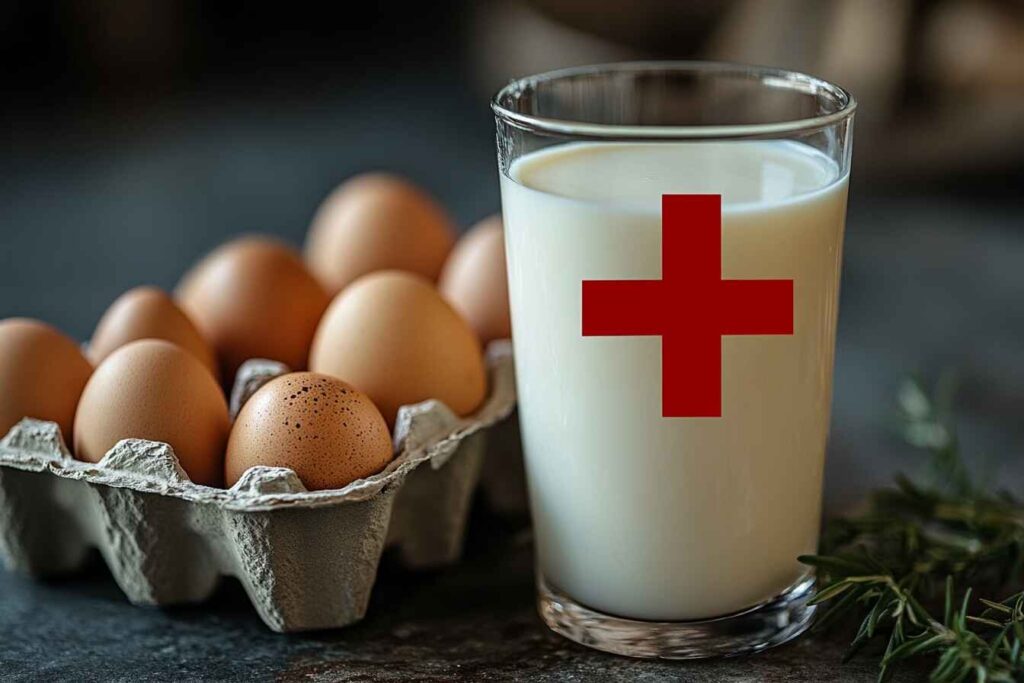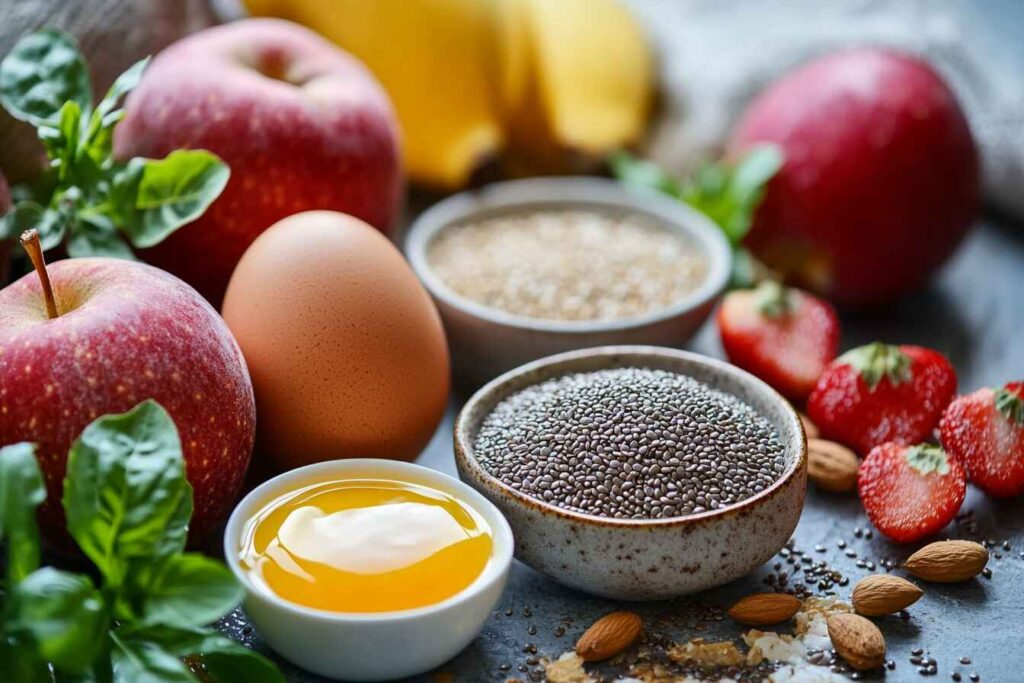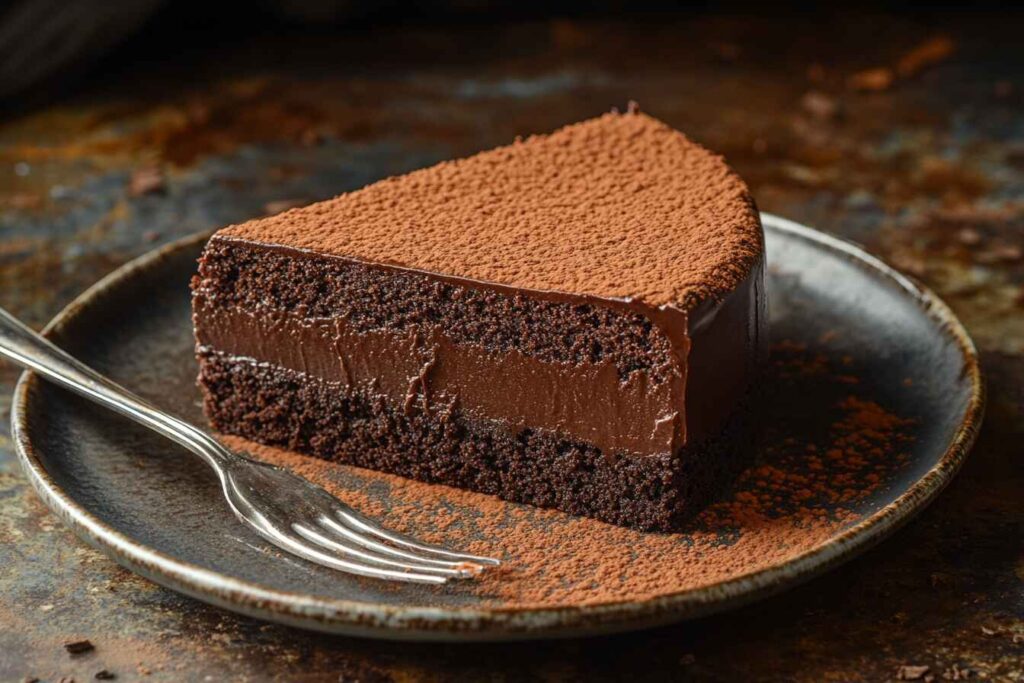Eggs are a staple in most kitchens. Whether you’re making breakfast, baking a cake, or adding some protein to your meal, eggs are everywhere. But if you’re dealing with food allergies or dietary restrictions, you might have asked yourself: Are eggs gluten-free and dairy-free?
It’s a valid question, especially when you’re trying to navigate food sensitivities. Many people assume eggs fall into the same category as dairy because they’re often found near milk and cheese in the grocery store. Others worry about cross-contamination with gluten.
Let’s break it down step by step. By the time you’re done reading, you’ll know exactly where eggs stand in the gluten-free and dairy-free world!
Understanding Gluten and Dairy in Food
Before we dive into eggs, let’s first understand what gluten and dairy actually are.
What is Gluten?
Gluten is a type of protein found in grains like:
- Wheat
- Barley
- Rye
- Spelt
It’s what gives bread its chewy texture and helps it rise. While gluten is harmless for most people, those with celiac disease or gluten sensitivity must avoid it completely.
Quick Fact: Even a tiny crumb of gluten can cause a reaction in someone with celiac disease!
What is Dairy?
Dairy refers to milk and any products made from milk, such as:
- Cheese
- Butter
- Yogurt
- Ice Cream
Dairy contains lactose, a sugar that many people struggle to digest. Those with lactose intolerance or a dairy allergy need to steer clear of dairy-based products.
Are Eggs Gluten-Free?
The short answer? Yes! Eggs are naturally gluten-free.
Do Eggs Contain Gluten?
Nope! Eggs come from chickens, and gluten comes from grains. There’s no natural way for eggs to contain gluten unless they are contaminated during processing.
Can Eggs Be Contaminated with Gluten?
While eggs themselves don’t have gluten, cross-contamination is a possibility. This can happen in several ways:
- Eggs cooked on a surface that previously had gluten (like a shared grill at a restaurant)
- Eggs processed in facilities that also handle gluten-containing foods
- Pre-packaged egg products (like scrambled egg mixes) that include additives with gluten
Pro Tip: Always check ingredient labels on processed eggs (like liquid eggs) to make sure they’re gluten-free.
How to Ensure Your Eggs Are Gluten-Free
Want to be extra cautious? Follow these steps:
- Buy fresh, whole eggs instead of processed egg products.
- Cook your eggs in a clean pan with gluten-free ingredients.
- Ask restaurants about potential cross-contact if you’re eating out.
Are Eggs Dairy-Free?
Now, here’s where things get interesting. Many people think eggs are a dairy product. But they’re not!
Do Eggs Contain Dairy?
No, eggs do not contain milk or any milk-based ingredients. They come from chickens, not cows!
Why Are Eggs Often Confused with Dairy?
There are two main reasons:
- Supermarket Placement: Eggs are often stocked near dairy products in grocery stores, which makes people assume they belong in the same category.
- Common Pairings: Many dairy-based recipes (like scrambled eggs with cheese) reinforce the idea that eggs are part of the dairy family.
Fun Fact: Dairy products come from animal milk, but eggs come from birds. That’s a big difference!

Where Do Eggs Fit in a Gluten-Free and Dairy-Free Diet?
So, if you’re avoiding gluten and dairy, can you still eat eggs? Absolutely! In fact, eggs are a great source of protein and healthy fats.
Can You Eat Eggs on a Gluten-Free Diet?
Yes! As long as you avoid cross-contamination, eggs are 100% safe for a gluten-free lifestyle.
Can You Eat Eggs on a Dairy-Free Diet?
Yes again! Since eggs don’t contain any milk, they’re perfectly fine for a dairy-free diet.
The Role of Eggs in Gluten-Free and Dairy-Free Recipes
Eggs are a powerhouse in cooking. Here’s why they’re essential in gluten-free and dairy-free baking:
- Binding Agent: Eggs help hold ingredients together, replacing the gluten structure in baked goods.
- Moisture Provider: Since dairy is often removed in these diets, eggs can add much-needed moisture.
- Leavening Agent: Eggs help baked goods rise, replacing traditional ingredients like buttermilk.
Common Problems and Concerns About Eggs in Special Diets
Even though eggs are naturally gluten-free and dairy-free, some people still face challenges when including them in their diet. From cross-contamination to hidden ingredients in processed egg products, let’s tackle the most common concerns.
Cross-Contamination Risks in Egg Processing
While fresh eggs straight from the shell are gluten-free, certain processing methods can introduce gluten or dairy contamination. Here’s how it can happen:
- Shared Equipment: Some food factories process eggs on the same equipment as gluten-containing foods.
- Coatings and Additives: Some pre-packaged egg products, such as liquid eggs, may contain stabilizers that include gluten.
- Restaurant Cooking Surfaces: If eggs are cooked on the same grill as pancakes or bread, they can be contaminated with gluten.
Pro Tip: If you have celiac disease or gluten intolerance, ask restaurants if they use a separate cooking surface for eggs.
Hidden Gluten or Dairy in Processed Egg Products
If you’re buying anything other than whole, fresh eggs, it’s important to check the ingredient list. Some processed egg products may contain hidden gluten or dairy.
Watch Out For:
- Liquid Egg Substitutes: Some brands add milk proteins or flavorings that contain dairy.
- Pre-Made Scrambled Eggs: Restaurants and frozen meals may use butter or cream in scrambled egg mixtures.
- Egg Wash on Baked Goods: Many baked goods use an egg wash that may contain milk-based ingredients.
To be safe, always check the label or ask about ingredients when dining out.
Egg Allergies vs. Dairy Intolerance vs. Gluten Sensitivity
Some people avoid eggs not because of gluten or dairy concerns, but due to allergies. Let’s clarify the differences:
| Condition | Reaction | Safe to Eat Eggs? |
|---|---|---|
| Celiac Disease | Immune reaction to gluten | Yes |
| Gluten Sensitivity | Digestive discomfort from gluten | Yes |
| Lactose Intolerance | Difficulty digesting dairy | Yes |
| Dairy Allergy | Allergic reaction to milk proteins | Yes |
| Egg Allergy | Allergic reaction to egg proteins | No |
Reminder: If you have an egg allergy, you’ll need to find alternatives, which we’ll cover next!
How to Choose Safe Eggs for a Gluten-Free & Dairy-Free Diet
When buying eggs, it’s always a good idea to read labels carefully. Here’s how to pick the best eggs:
What to Look for on Egg Cartons
To ensure your eggs are safe, check for these terms on the label:
- “100% Natural Eggs”: This means the eggs have no added ingredients.
- “Gluten-Free Certified”: Some brands voluntarily label their eggs gluten-free.
- “No Additives or Preservatives”: Avoid eggs with fillers or stabilizers.
Organic, Free-Range, and Pasture-Raised Eggs: Are They Safer?
There are many types of eggs available. Which one is the best choice?
- Organic Eggs: Raised without antibiotics or synthetic pesticides, but still processed in factories that may handle gluten.
- Free-Range Eggs: Chickens have some access to the outdoors, but quality varies.
- Pasture-Raised Eggs: Often considered the best option since hens roam freely and eat a natural diet.
If you’re looking for the cleanest option, pasture-raised eggs from a trusted brand are your best bet!
Best Practices for Handling and Cooking Eggs
Even if you buy the best-quality eggs, cross-contamination can still happen in your own kitchen. Follow these steps to keep your eggs safe:
- Store eggs in a clean area of the fridge, away from gluten-containing foods.
- Use separate utensils when cooking eggs to prevent gluten contamination.
- If frying eggs, make sure your pan hasn’t been used to cook gluten-containing foods.
Egg Substitutes for Those Avoiding Eggs, Gluten, and Dairy
What if you’re avoiding eggs entirely? Whether due to allergies, dietary choices, or lifestyle preferences, there are plenty of substitutes available.
Vegan and Allergy-Friendly Egg Alternatives
Many plant-based ingredients can replace eggs in recipes. Here are some great options:
| Egg Substitute | Best For | How to Use |
|---|---|---|
| Flaxseed or Chia Seed Egg | Baking, pancakes | Mix 1 tbsp ground flax/chia seeds with 3 tbsp water, let sit for 5 minutes |
| Mashed Banana | Muffins, cakes | Use 1/4 cup mashed banana per egg |
| Unsweetened Applesauce | Baking, brownies | Use 1/4 cup applesauce per egg |
| Silken Tofu | Dense baked goods, creamy dishes | Use 1/4 cup blended silken tofu per egg |
Best Egg Substitutes in Gluten-Free Baking
For gluten-free baking, choosing the right egg substitute is key. Here’s what works best:
- For cookies: Applesauce or banana
- For cakes: Flax egg or aquafaba (chickpea water)
- For bread: Psyllium husk mixed with water
Nutritional Considerations When Avoiding Eggs
Eggs are a great source of protein, vitamin B12, and iron. If you’re avoiding them, make sure you’re getting these nutrients from other sources like:
- Protein: Beans, lentils, quinoa
- B12: Fortified plant-based milks, nutritional yeast
- Iron: Leafy greens, tofu, fortified cereals

Tips for Cooking Gluten-Free & Dairy-Free with Eggs
Now that we know eggs are both gluten-free and dairy-free, let’s talk about how to cook them in a way that keeps your meals safe and delicious! Whether you’re making breakfast, baking, or preparing a savory dish, these tips will help you get the most out of your eggs.
Simple Breakfast Ideas Using Eggs
Eggs are a breakfast superstar. Here are a few gluten-free and dairy-free ways to enjoy them:
1. Classic Scrambled Eggs (Dairy-Free)
Most people add milk or cream to their scrambled eggs, but you don’t need it! Try this easy dairy-free version.
Ingredients:
- 2 large eggs
- 1 tbsp olive oil or dairy-free butter
- Salt and pepper to taste
- 1 tbsp dairy-free milk (optional, for fluffiness)
Instructions:
- Crack the eggs into a bowl and whisk until smooth.
- Heat olive oil or dairy-free butter in a pan over medium heat.
- Pour in the eggs and let them sit for a few seconds before stirring.
- Stir gently until the eggs are soft and slightly runny.
- Remove from heat (they’ll continue cooking from residual heat).
- Season with salt and pepper, and enjoy!
2. Avocado Toast with Poached Eggs
This protein-packed, gluten-free meal is quick and satisfying.
Ingredients:
- 1 gluten-free bread slice
- 1/2 avocado, mashed
- 1 egg
- 1 tsp vinegar
- Salt and red pepper flakes to taste
Instructions:
- Toast your gluten-free bread.
- Spread mashed avocado on top.
- Boil a pot of water and add vinegar.
- Crack an egg into a small bowl and gently slide it into the water.
- Let the egg poach for about 3 minutes, then remove with a slotted spoon.
- Place the egg on top of the avocado toast and season with salt and red pepper flakes.
How to Make Dairy-Free Scrambled Eggs Taste Great
Missing the creamy taste of dairy in your eggs? Try these substitutes:
- Dairy-Free Butter: Adds a rich, buttery flavor.
- Coconut Milk: A splash of coconut milk makes eggs soft and creamy.
- Nutritional Yeast: Gives eggs a cheesy, umami flavor without dairy.
Pro Tip: Whisking eggs thoroughly before cooking makes them fluffier.
Egg-Based Gluten-Free Desserts
Eggs play a huge role in baking, helping cakes rise and cookies hold together. Here are some simple gluten-free and dairy-free desserts using eggs.
1. Flourless Chocolate Cake
This rich, fudgy cake is perfect for chocolate lovers.
Ingredients:
- 4 large eggs
- 1/2 cup coconut oil (or dairy-free butter)
- 1 cup dark chocolate (dairy-free)
- 1/2 cup coconut sugar
- 1/4 cup cocoa powder
- 1 tsp vanilla extract
- Pinch of salt
Instructions:
- Preheat oven to 350°F (175°C) and grease a cake pan.
- Melt the chocolate and coconut oil together.
- In a separate bowl, whisk eggs and coconut sugar until fluffy.
- Gently fold in the melted chocolate mixture.
- Add cocoa powder, vanilla, and salt. Mix until combined.
- Pour the batter into the pan and bake for 25 minutes.
- Let it cool before serving.
2. Gluten-Free & Dairy-Free Custard
This simple custard is creamy and delicious without any dairy.
Ingredients:
- 4 egg yolks
- 2 cups almond milk
- 1/4 cup maple syrup
- 1 tsp vanilla extract
- 1 tbsp cornstarch
Instructions:
- Heat almond milk over medium heat until warm.
- In a bowl, whisk egg yolks, maple syrup, and cornstarch.
- Slowly add warm almond milk while whisking.
- Return to the stove and cook until thickened, stirring constantly.
- Remove from heat, add vanilla, and let cool.
- Serve chilled.

FAQs About Eggs, Gluten, and Dairy-Free Diets
Let’s answer some of the most common questions people have about eggs and dietary restrictions.
Can People with Celiac Disease Eat Eggs?
Yes! Eggs are naturally gluten-free. Just make sure they aren’t contaminated with gluten during cooking.
Are Powdered and Liquid Eggs Gluten-Free and Dairy-Free?
Not always! Some brands add stabilizers that may contain gluten or dairy. Always check the ingredient list.
How Can I Be Sure My Eggs Are Safe?
Look for whole eggs from trusted sources, read labels carefully, and avoid cross-contamination in your kitchen.
Key Takeaways About Eggs, Gluten, and Dairy
- Eggs are naturally gluten-free and dairy-free.
- Cross-contamination is the biggest risk. Use clean cooking surfaces and check labels on processed egg products.
- Eggs play a vital role in gluten-free and dairy-free cooking. They add texture, flavor, and nutrients.
- If you can’t eat eggs, there are great substitutes. Try flax eggs, applesauce, or mashed bananas.
Final Thoughts and Next Steps
By now, you should have a clear understanding of whether eggs fit into a gluten-free and dairy-free diet (they do!). You also have some fantastic recipes and tips to try at home.
So what’s next? Head to your kitchen and start experimenting with some delicious egg-based meals. And if you found this article helpful, share it with friends who might be wondering the same thing!
Want more gluten-free and dairy-free recipes? Stay tuned for more cooking tips and ideas!

